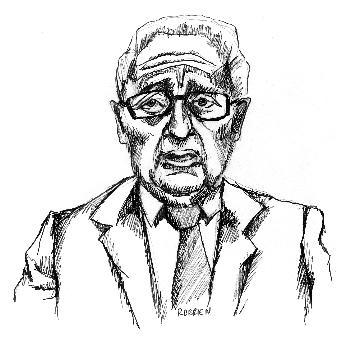
News
Summers Will Not Finish Semester of Teaching as Harvard Investigates Epstein Ties

News
Harvard College Students Report Favoring Divestment from Israel in HUA Survey

News
‘He Should Resign’: Harvard Undergrads Take Hard Line Against Summers Over Epstein Scandal

News
Harvard To Launch New Investigation Into Epstein’s Ties to Summers, Other University Affiliates

News
Harvard Students To Vote on Divestment From Israel in Inaugural HUA Election Survey
The Kissinger Solution
Editorial Notebook

Initially, President Bush’s selection of Henry A. Kissinger ’50 to head a panel to investigate pre-Sept. 11 intelligence failures may seem an odd one. After all, until recently Kissinger publicly resurfaced from his mysterious consulting firm only for rare press interviews. And despite the complaints of vehement commentators like Christopher Hitchens, who would like to see the former national security advisor and secretary of state indicted for war crimes, Kissinger has largely faded from current public consciousness to become a figure for history books.
The selection of Kissinger, however, is a meaningful one, demonstrating that Bush is serious about the panel and its duty. Bush’s choice is symbolic also, a hint to lawmakers that the administration remembers—and may assent to—Kissinger’s effective, if controversial, political methods.
Originally, the panel was thrust upon Bush by the Democratic Senate to win their party much-needed support during the height of Bush’s sky-high popularity. So, when this political nonsense became reality due to popular demand, Bush had to find an appropriate way to accommodate the majority of the Senate, while molding the policy to his own political objectives. Enter Kissinger, whose selection represents two motives: one practical and one ideological.
The practical one stems from the Bush administration’s realization that when a feisty congressional body throws the president lemons, he ought to make lemonade. Indeed, a panel with the ad hoc purpose to consider retroactively the failures of an intelligence community that no longer exists in its pre-Sept. 11 structure serves little purpose today. However, Kissinger will have the opportunity—if he takes it—to modify the panel’s objectives. The current mandate given by Congress is broad, but Bush’s implementation of it had been expected to be merely an open-and-shut investigation of intelligence failures and a report back to Congress of already-known information. Yet at the press conference announcing his selection of Kissinger, Bush advised the committee to “follow all the facts, wherever they lead.” With Kissinger in charge and presidential instructions to go all out, the committee will not flinch in proposing broad revisions to the intelligence community’s methods, organizational structure and domain of operations. Far from being only a reflective study on what could have prevented last year’s terrorist attacks, the panel’s chief purpose will be to develop proactive policy recommendations to bolster the efficacy of the new Department of Homeland Security.
But in addition to choosing an experienced and talented person for this challenging job, Bush seems to be offering his ideological support for Kissinger’s controversial diplomatic methods—methods that will likely resurface in the committee’s final report. Kissinger is a man who operates under the principle that the ends justify the means. Although he achieved what other diplomats could not in opening China in 1972 and negotiating the end to both the Yom Kippur and Vietnam wars, his devotion to realpolitik in the 1960s and ’70s was unparalleled and remains significant today. After all, more than a diplomat, Kissinger is an idea, evoking images of old-fashioned espionage and its effectiveness. He has previously shown great willingness to implement practices that other diplomats shy away from in the post-Cold War era, including policies that require near-absolute secrecy and dealings with controversial figures.
Given America’s need for an effective intelligence-gathering organization and not a starry-eyed one, the selection of Kissinger is wise. He will not only offer remedies that draw on his considerable experience, but his advice will also be all the more thoughtful and provocative with the knowledge that this will almost certainly be his last major diplomatic hurrah. Of course, it will ultimately be up to Bush and Congress to decide whether or not to implement the Kissinger committee’s recommendations. But the choice is heartening for all who want to see an improved security system in America. Indeed, it was Congress that demanded innovative solutions to the intelligence operations nightmare. And with Henry Kissinger, innovation is exactly what they’ll get.
Want to keep up with breaking news? Subscribe to our email newsletter.
